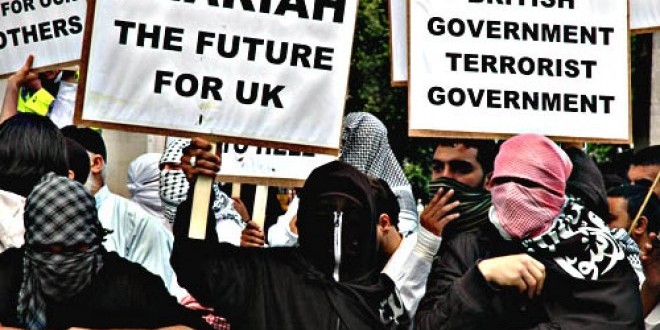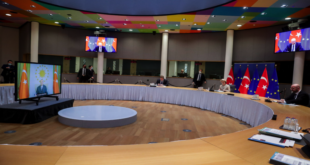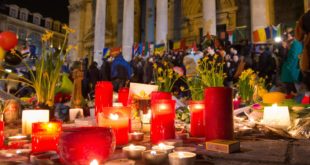Following the 2013 murder of Lee Rigby, Tony Blair offered a characteristically vacuous response: “there is not a problem with Islam…but there is a problem within Islam”. That is, while not quite bigoted enough to equate Islam with terrorism in toto, Blair (for obvious reasons) still presents violent extremism as a phenomenon entirely autochthonous to the Islamic faith. With three teenage British girls recently flying out to join the “Islamic State”, the subject of second-generation Muslim “radicalisation” is once more front-page.
However, Blair’s image of a self-generating dynamic, driven solely by ideology, is a myth. Religious identity, like any other, is not static; rather, as many Islamic philosophers and theologians themselves have clearly understood over the centuries, it evolves through a dialectic with secular-historical circumstance. There is, in other words, no independent, unitary “thing” called “Islam” which can be abstracted from its mundane context and attacked, defended or analysed as an a priori given.
All this means in layman’s terms is that the emergence of a particular form of any religion is not driven exclusively or even primarily by factors internal to that religion. No matter how fervently extreme Islamists and Islamophobes alike try to convince us otherwise, the apparently increasing “radicalisation” of European Muslims cannot be understood through clumsily cherry-picked Quranic quotations.
On the contrary: we have to look at society as a whole and ask how the position of “second-generation” Muslims (meaning any from a migrant background born in the “host” country) differs from that of the first. Furthermore, the strength of any particular identity is always relative to the weakness of others. As such, the rise of “fundamentalist” Islamism must be contextualised within the decline of other forms of identity, most notably those based on class, which previously attracted politicised Muslims in the UK.
The first-generation: social democracy and class compromise
The first truly large-scale Muslim migration to Britain came in the aftermath of World War II, when cheap labour was needed to rebuild the cities and industries of the colonial metropole. Actively recruited to fill the jobs British workers were unwilling to take, these labourers were not strictly speaking “immigrants”, but subjects moving from one part of the Empire to another.
The country they arrived in was vastly different from today. With post-war reconstruction following Keynesian principles of high public investment and full employment, alongside the Attlee government’s commitment to building a universal welfare state, Britain was embarking on a long period of historic “class compromise”. Mitigating the worst effects of capitalism through robust social democracy, this lasted from the Second World War until the rise of Thatcherism. As shown by figures from the International Monetary Fund (IMF), the result was several decades of the lowest levels of inequality seen in the industrial age.
What made post-war working-class gains possible was, of course, the mobilisation and strength of the working class itself. Although the relationship between white British and migrant workers was not plain sailing (racism has never been exclusive to the far right), Muslim labourers not only frequently participated in class-based political movements, but were often amongst their most committed and militant members.
Indeed, while always conducting simultaneous anti-racist struggles, Muslim and other migrants during this period identified overwhelmingly in class terms. According to Professor Farzana Shain of Keele University:
“In the early post-war years, immigration, religious, cultural and ethnic ties were largely cast aside as Asian Muslims, Hindus and Sikhs worked together and alongside other black and white workers to counter the impact of growing social exclusion, poor housing conditions, racism and economic inequalities. These early immigrants identified, and were also identified by the state, primarily as workers, which was a critical factor enabling alliances to be built with white British workers and trade unionists. The alliance was formed on a secular basis, with religion regarded as a private matter and secondary to the general struggle against the forces of capitalism.”
Like the workers’ movement as a whole, migrants’ mobilisation along class lines was facilitated by numerous robust grass-roots institutions and organisations. These included independent unions and migrant factions within larger, white-dominated unions, as well as community groups like the Indian Workers’ Association (IWA). Founded in Coventry in 1938 and campaigning on a broad range of social and political issues, this spread across England and included large numbers of (almost entirely Muslim) Pakistani and Bangladeshi workers after the 1947 partition of India.
The 1960s, ‘70s and ‘80s also saw the proliferation of radical youth groups amongst urban Muslim and other migrant populations. Often inspired by the American Black Panthers, these groups attributed their ethnic and racial subordination to capitalism as a general system of oppression and exploitation. Even in the face of widespread discrimination from largely white workers’ movements and unions, such groups thus nevertheless understood the struggles of migrant and British labouring classes as mutually dependent. This led to a high degree of class solidarity, with Muslims and other migrants, including women, often on the front lines of strikes, sit-ins and occupations.
Writing on the famous 1976-8 strike at the Grunwick Film Processing Plant in Willesden, North London, Jack and Graham Taylor comment on this cross-ethnic, class-based alliance. Just as radical Muslim youth movements strongly supported the miners’ strike during the 1980s,
“it was the arrival in Willesden of thousands of [white] trade unionists from all over Britain which was to reassure the strikers [90% of whom were Asian, a significant proportion of these Muslim] that they were not, after all, alone and that besides the right wing section of the labour movement there was also a left wing, a radical and a militant section which responded with class feeling to the call of all workers in struggle, whether male or female, manual or clerical, black or white”
Alongside this domestic context, the international stage was also conducive to united, class-based struggles. In stark contrast to today, the Cold War and existence of the Soviet Union cast global politics in terms of the opposition between capital and labour. Many migrants, moreover, came from “Third World” countries in which anti-colonial struggle and post-colonial developmentalism were heavily influenced by socialist ideals.
Although the first-generation of Muslim migrants faced many challenges and multiple forms of exclusion, the Britain they arrived in was nonetheless characterised by a high degree of class consciousness. In significant sections of both white and minority workers’ movements, this stood above and beyond ethnic and religious identities. Ideationally and institutionally, this provided an avenue for Muslim migrants to challenge both their particular racialised subordination and their more general oppression within a united labouring class.
Just as this largely secular (not “anti-religious”), unifying movement was facilitated by the broader conditions of British society and international politics at the time, so its decline and partial eclipse by religious identity-politics is an outcome of wider developments in these arenas.
The second-generation: neoliberalism and (one-way) class war
It should go without saying that a significant contributor to the rise of Islamist extremism within European Muslim populations is the massive violence of the “War on Terror”. The growing ability of reactionary states such as Saudi Arabia and Qatar to directly or indirectly promote extremist versions of Islam – through networks first established, as Mahmoud Mamdani reminds us, by the CIA during the 1979-89 Afghan War – is also of obvious relevance, as are the oft-cited chatrooms and social media sites. I have covered some of these issues elsewhere, as have many others.
Less widely discussed, however, are developments within Britain itself which, at least since Margaret Thatcher’s victory in the 1979 general election, have destroyed the post-war “class compromise” and, with it, much of the basis for broad working-class unity.
Inspired by Milton Friedman and Friedrich Hayek, Thatcher abandoned Keynesian economics and social democracy for free-market neoliberalism. As analysed by scholars such as David Harvey and John Weeks, this represented – and continues to represent – a project of elite class power and a form of unidirectional class warfare on a massive scale. Reversing the gains of the mid-twentieth century, neoliberalism has raised inequality in the UK to more extreme levels than at any point since the 1920s – a fact which not even the IMF deny.
An essential precondition for the imposition of neoliberalism was the defeat of the working class by the British state, symbolised most memorably by Thatcher’s breaking of the miners’ strike. A rough indication of the extent of the broader assault is the vast drop in union membership: despite large population growth, this fell from 13 million in 1979 to just 6.5 million in 2012. Unions themselves are, of course, also far less radical, while the emergence of “New Labour” means that there is no longer any mainstream party even moderately committed to the working class. Alongside widespread de-industrialisation, this has severely eroded labour’s cohesion, confidence and consciousness to assert its interests as a unified group.
In both the rising levels of inequality and the loss of working-class solidarity, Muslims have been disproportionately affected. According the Poverty Site, in the UK 50% of Black Africans, 60% of Pakistanis and 70% of Bangladeshis (all groups with high or near-exclusive Muslim populations), including “second generations”, live in low-income households or below the poverty line, compared to 20% of whites.
As OECD statistics demonstrate, this pattern repeats across Europe. France’s infamous banlieues, largely inhabited by mostly Muslim migrants or children of migrants from former colonies, suffer three times the national poverty rate. In Belgium, despite the country having one of the EU’s highest standards of living overall, 55.6% of ethnic Moroccans and 58.94% of Turks live below the poverty line. When uneven access to resources so clearly correlates with ethnic and/or religious identities, these easily become politicised in the absence of any counterbalancing class solidarity.
Within its general attack on working-class institutions, the British state also adopted a specific strategy against Muslims. As documented by scholars such as Arun Kundnani, this involved establishing a network of conservative mosques in major urban centres, explicitly aiming to replace a unified class identity with an isolated religious one. Such an essentially right-wing “divide and conquer” approach was, of course, also helped by the failure of the British left to address its own racism and integrate other forms of oppression into its ethno-centric conception of class. Meanwhile, the youth movements of previous decades have been largely de-radicalised, transformed into apolitical community organisations through acceptance of state funding.
Even if sometimes fraught with divisions, the first generation of Muslim migrants thus found avenues to participate in secular, class-based movements which simply do not exist today. However, the sources of Muslims’ marginalisation remain and have in many cases grown. In addition to the aforementioned increase in economic inequality, these include a dramatic rise in Islamophobia, widespread institutionalised racism and increasingly draconian “anti-terror” legislation which, as groups such as Amnesty International and Liberty have shown, primarily functions to legitimate the hyper-policing of poor ethnic minorities – much as the “war on drugs” has for decades in the United States.
With the institutional basis for class unity having been systematically dismantled and the language of class having been purged from mainstream political discourse, other identities inevitably fill the void. The rise of “fundamentalist” Islam – a thoroughly modern ideology without true historical precedent – can only be understood as parallel to this decline in class association. The process of radicalisation itself occurs through young Muslims’ disproportionate experience of the exclusions, contradictions and hypocrisies of western societies as a whole, not through a religion of which they often have only the most superficial understanding.
That the “second generation” of Muslims, born and raised in the west, appear far more receptive to “fundamentalist” Islam than the first is evidence not of any inherent “incompatibility” between “them” and “us” or residue of civilisational backwardness. It is, rather, a sign of the failure of progressive politics at large and the withering away of alternative avenues of radical political association.
On the need for radical politics
First-generation migrants’ deep involvement in the militant labour movement demonstrates that it is not strictly true to say that British Muslims are becoming “more radical”. On the contrary: they have always been radical, because only radicalism is capable of challenging the multiple, intersecting forms of class and racial subordination to which Muslims populations have always been subjected. When no mainstream party any longer stands for even the basic principles of centre-left social democracy which once mitigated this subaltern status, and within the general context of widespread disillusionment with parliamentary politics, such radicalism is more needed than ever.
Extreme forms of political Islam are gaining ground because, whatever else they preach, they speak directly of social justice, valorise the very forms of identity vilified by wider society and, however crudely, rationalise daily experiences of marginalisation and subordination into a coherent worldview within which one can exercise agency as a political subject. A state-sponsored, de-politicised Islam or liberal platitudes simply cannot compete with its directness and power, because they do not speak to the same issues or satisfy the same needs. None of this means that we should regard reactionary forms of Islamism as “progressive”; rather, they occupy the ground where progressive politics once stood.
The rise of such ideologies follows not the logic of Islam itself, but that of wider developments within British society and international politics. It is entirely congruent with neoliberalism’s destruction of class solidarity, with the mainstream framing of problems and divisions in ethnic or “cultural” rather than socio-political terms, with the xenophobic hysteria over “migrant” populations, with the “clash of civilisations” rhetoric of the “War on Terror” and with the resulting retreat of economically and politically marginalised groups (including sections of the white working class) into “traditional” forms of solidarity.
Until the dominance of what Tariq Ali calls the “extreme centre” of British politics – the largely indistinguishable and entirely uninspiring “moderate” parties advancing elite interests – is challenged and alternative avenues of progressive radicalism open up, no amount of mass surveillance or anti-democratic legislation will dull the appeal of Islamist “fundamentalism”. That will only happen with the rediscovery of a history of inclusive solidarity, anchored in less dogmatic understandings of class capable of both incorporating and respecting the autonomy of the struggles of Muslims and other minority groups.
 ForMENA Council for MENA affairs
ForMENA Council for MENA affairs




